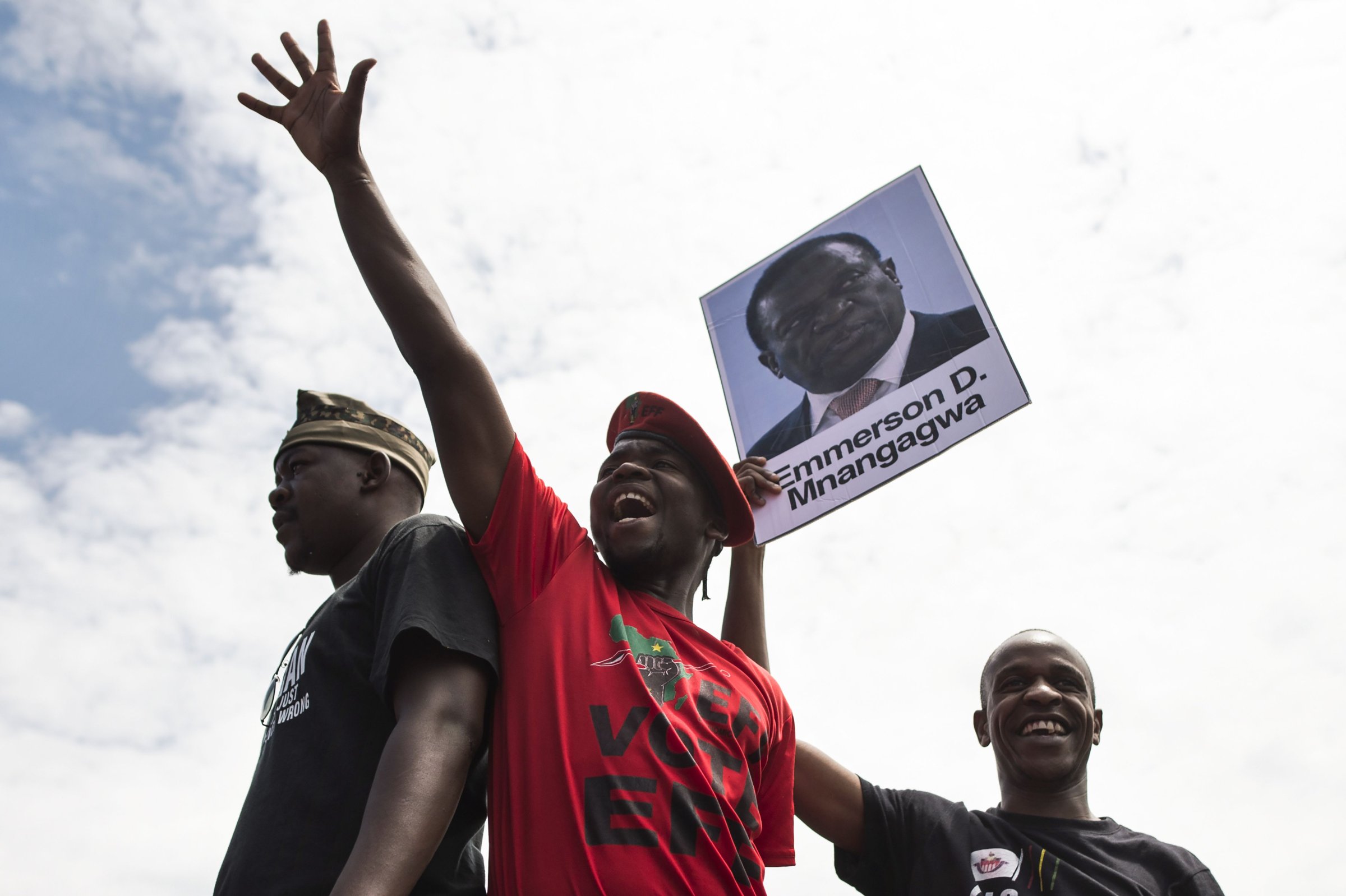
As news emerged that President Robert Mugabe, a one-time freedom fighter who has ruled the southern African nation with an iron fist for 37 years, had resigned his post, the streets of Zimbabwe’s capital erupted in joy. Through the night, the Zimbabwean capital echoed with exuberant car horn blasts as revelers danced.
In neighboring South Africa, members of the Zimbabwean diaspora celebrated with raucous singing and firework displays. Many of them hold Mugabe responsible for their exile—the country, once the breadbasket of southern Africa, has seen the economy collapse under his rule, sending an estimated three million Zimbabweans across the border in search of employment. “This is a new beginning for Zimbabwe,” beamed Yolanda Nyngana, a 23-year-old interior designer who works as a housekeeper in Cape Town. “This Mugabe, he has been so bad for our country. Even people with an education have no jobs, but his family has been living off the country’s wealth for years. We lost everything because of this man.”
Mugabe’s resignation capped a tense week that started with the military placing the president under house arrest on Nov. 14. Though the move had all the markings of a coup, military leaders insisted that they were instead clearing out the “criminals” that had undermined the president’s leadership, most likely a reference to supporters of his wife, Grace Mugabe, who has been angling to succeed the 93-year-old in the presidency.
Protestors took to the streets when the President refused to step down, prompting his party to suspend him, and parliament to launch impeachment proceedings. As the initial proceedings concluded in parliament on Nov. 21, members of Mugabe’s cabinet rushed in with a letter of resignation from the President. “My decision to resign …. arises from my concern for the welfare of the people of Zimbabwe and my desire to ensure a smooth, peaceful and non-violent transfer of power that underpins national security, peace and stability,” the President wrote. As the speaker of the house read it aloud, parliamentarians cheered.
Zimbabweans have every reason to celebrate the end of an era defined by economic mismanagement, government corruption and human rights abuses, but after living through 37 years of dictatorship, expectations for rapid improvement in the country’s economy and political direction are likely to go unmet.
That’s because many feel that Mugabe’s successor, former vice president Emmerson Mnangagwa, will carry on much as before when he is sworn in on Friday. The two worked side by side for much of the President’s reign. In a diplomatic cable posted on Wikileaks in 2000, the U.S. State Department noted that Mnangagwa was “widely feared and despised throughout the country” and “could be an even more repressive leader” than Mugabe. He remains on the U.S. sanctions list, along with General Constantino Chiwenga, the military leader who helped push Mugabe out of power, for his role in repressing democracy in Zimbabwe. Kenneth Roth, the executive director of Human Rights Watch, tweeted photos of Mugabe and Mnangagwa next to each other. “Zimbabwe’s dictator finally resigns. Now don’t replace him with another.”
Mnangagwa is accused of leading a vicious military campaign against an opposition leader in 1983 that resulted in the massacre of thousands of members of the minority Ndebele ethnic group. As Mugabe’s campaign manager during the 2008 presidential elections, Mnangagwa was widely blamed for spearheading the street violence that came in the wake of the opposition’s success in the first round of voting, and the crackdown that eventually delivered a compromised victory to the ruling party. He is widely known by his nickname — “the Crocodile.”
He was appointed vice president in 2014, and, at the time, was widely assumed to be Mugabe’s chosen successor. It was Mugabe’s abrupt dismissal of Mnangagwa, on Nov. 7, that precipitated the military’s intervention. While Mugabe cited disloyalty, most in government saw it as an attempt by Grace Mugabe to insert herself into the succession race by taking his place as vice president. At this point, Ms. Mugabe’s whereabouts are unknown.
Despite his compromised past, Mnangagwa is the best bet for a peaceful transition of power in Zimbabwe, says J. Peter Pham, director of the Atlantic Council’s Africa Center. “I’m not going to whitewash his past, but one can’t live in a fairytale either.” Mugabe’s resignation, forced or not, is an important first step in any kind of democratic transition, he notes. So too is the succession of a leader that commands the military’s loyalty and the respect of the ruling party—at least until elections. “Mnangagwa is an experienced hand. It will behoove us to wait and see what his first steps are and reserve judgment.”
Interior designer-turned-housemaid Nyngana agrees. “Anyone is better than Mugabe,” she says. More to the point, the threat of upcoming elections is likely to keep Mnangagwa in line, and force him to implement at least some of the changes Zimbabweans want to see. Inflation is so high in Zimbabwe at the moment that relatives ask her to send groceries home from South Africa instead of money. “If Mnangagwa wants to win, he will make sure that people can afford cooking oil again, at the very least,” she says. She might even head home for the elections, her first trip back in nearly three years. “I was never interested in voting before, because we already knew who was going to win. This time I can choose the person who I think is best for Zimbabwe.” And, if all goes well, the person after that.
More Must-Reads from TIME
- Cybersecurity Experts Are Sounding the Alarm on DOGE
- Meet the 2025 Women of the Year
- The Harsh Truth About Disability Inclusion
- Why Do More Young Adults Have Cancer?
- Colman Domingo Leads With Radical Love
- How to Get Better at Doing Things Alone
- Michelle Zauner Stares Down the Darkness
Contact us at letters@time.com